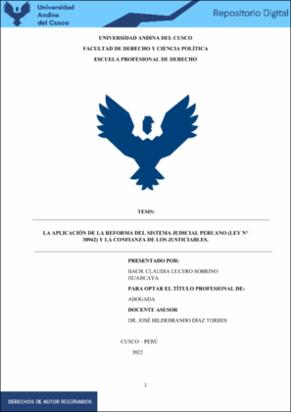| dc.contributor.author | Sobrino Huarcaya, Claudia Lucero | |
| dc.date.accessioned | 2022-12-21T20:38:45Z | |
| dc.date.available | 2022-12-21T20:38:45Z | |
| dc.date.issued | 2022-11-27 | |
| dc.identifier.uri | https://hdl.handle.net/20.500.12557/5030 | |
| dc.description.abstract | A lo largo de 17 años se han venido realizando múltiples intentos por reformar el sistema
de justicia en el Perú. Sin embargo, a pesar de la implementación de dichas reformas el
índice de confianza en el sistema de justicia por parte de los justiciables siguió
incrementado.
En el año 2018 a raíz de los escándalos de corrupción al interior de las instituciones de
justicia, se creó la Comisión Consultiva que fue denominada Comisión de Reforma del
Sistema de Justicia con la RS N°142-2018-PCM se presentó un paquete de 8 proyectos
de Ley, que posteriormente se promulgaron. En ese sentido, se creó la Junta Nacional de
Justicia (Ley N°30916) en reemplazo del Consejo Nacional de la Magistratura (CNM)
con el objetivo de nombrar a través de un concurso público a jueces y fiscales de todos
los niveles. Asimismo, se creó la Autoridad Nacional de Control del Poder Judicial (Ley
N°30943) y la Autoridad Nacional de Control del Ministerio Público (Ley N°30944), Ley
N°30914 que excluye al Ministerio Público del Proceso Contencioso Administrativo, Ley
N°30943 de Transparencia y Acceso a la Información Pública y finalmente, la Ley
N°30942 que crea el Consejo para la Reforma del Sistema de Justicia.
Se lleva a cabo a lo largo del trabajo de investigación, un tratamiento profundo sobre la
creación del Consejo para la Reforma del Sistema de Justicia en torno a la función de
crear la Propuesta de Política Pública de Reforma del Sistema de Justicia; a fin de
determinar si dicha Reforma promueve la confianza de los justiciables en el sistema de
justicia. En ese entender, la confianza de los justiciables resulta determinante para fortalecer el
Estado de Derecho a través del aseguramiento del acceso a la justicia, la interoperabilidad
del sistema de justicia, la modernización de los procesos penales y fortalecer las políticas
anticorrupción. Sin embargo; como se han comprobado de las entrevistas realizadas a
actores involucrados en la Reforma del Sistema de Justicia, la reforma de sistema de
justicia no ha sido del todo planteada desde las necesidades de los justiciables sino desde
la mirada de expertos procesalistas. | es_PE |
| dc.description.abstract | Over the past 17 years, multiple reforms of the Peruvian justice system have been
attempted. However, despite the implementation of these reforms, the index of confidence
in the justice system by the justiciable continued to increase.
In 2018 because of the corruption scandals within the justice institutions, the Consultative
Commission was created, which was called the Justice System Reform Commission with
RS N°142-2018-PCM a package of 8 bills was presented, which were subsequently
enacted. In this regard, the National Justice Board (Law N°30916) was created to replace
the National Council of the Magistracy (NCM) with the purpose of appointing through a
public competition judges and prosecutors at all levels. Also, the National Authority of
Control of the Judiciary (Law N°30943) and the National Authority of Control of the
Public Ministry (Law N°30944), Law N°30914 that excludes the Public Ministry from
the Contentious Administrative Process, Law N°30943 of Transparency and Access to
Public Information and finally, Law N°30942 that creates the Council for the Reform of
the Justice System were created.
Throughout the research work, an in-depth treatment of the creation of the Council for
the Reform of the Justice System is carried out in relation to the function of creating the
Public Policy Proposal for the Reform of the Justice System; in order to determine
whether such if Reform promotes the confidence of the justiciable in the justice system.
In this understanding, the confidence of the justiciable is decisive to strengthen the Rule
of Law through the assurance of access to justice, the interoperability of the justice
system, the modernization of criminal proceedings and the strengthening of anti-
corruption policies. However, as it has been proven from the interviews with the actors
involved in the Reform of the Justice System, the reform of the justice system has not been entirely based on the needs of the justice system but from the point of view of
proceduralist experts. | en_US |
| dc.format | application/pdf | es_PE |
| dc.language.iso | spa | es_PE |
| dc.publisher | Universidad Andina del Cusco | es_PE |
| dc.rights | info:eu-repo/semantics/restrictedAccess | es_PE |
| dc.rights.uri | https://creativecommons.org/licenses/by-nc-nd/4.0/ | es_PE |
| dc.subject | Reforma judicial | es_PE |
| dc.subject | Sistema de justicia | es_PE |
| dc.subject | Confianza | es_PE |
| dc.title | La aplicación de la reforma del Sistema Judicial Peruano (Ley N°30942) y la confianza de los justiciables. | es_PE |
| dc.type | info:eu-repo/semantics/bachelorThesis | es_PE |
| thesis.degree.name | Abogado | es_PE |
| thesis.degree.grantor | Universidad Andina del Cusco. Facultad de Derecho y Ciencia Política | es_PE |
| thesis.degree.discipline | Derecho | es_PE |
| dc.publisher.country | PE | es_PE |
| dc.subject.ocde | https://purl.org/pe-repo/ocde/ford#5.05.00 | es_PE |
| renati.advisor.dni | 23956366 | |
| renati.advisor.orcid | https://orcid.org/0000-0002-9869-3057 | es_PE |
| renati.author.dni | 72545711 | |
| renati.discipline | 421016 | es_PE |
| renati.juror | Salazar Mujica, Alan Felipe | |
| renati.juror | Martiarena Gutierrez, Leoncio | |
| renati.juror | Abarca Alfaro, Marco Antonio | |
| renati.juror | Zuniga Mojonero, Fredy | |
| renati.level | https://purl.org/pe-repo/renati/level#tituloProfesional | es_PE |
| renati.type | https://purl.org/pe-repo/renati/type#tesis | es_PE |



